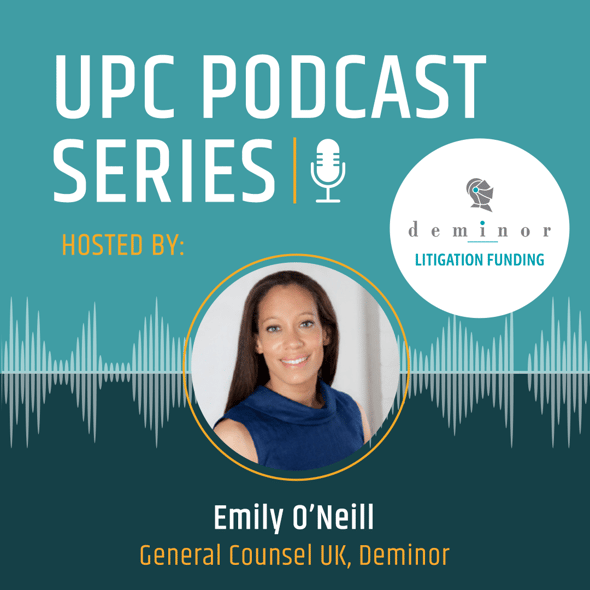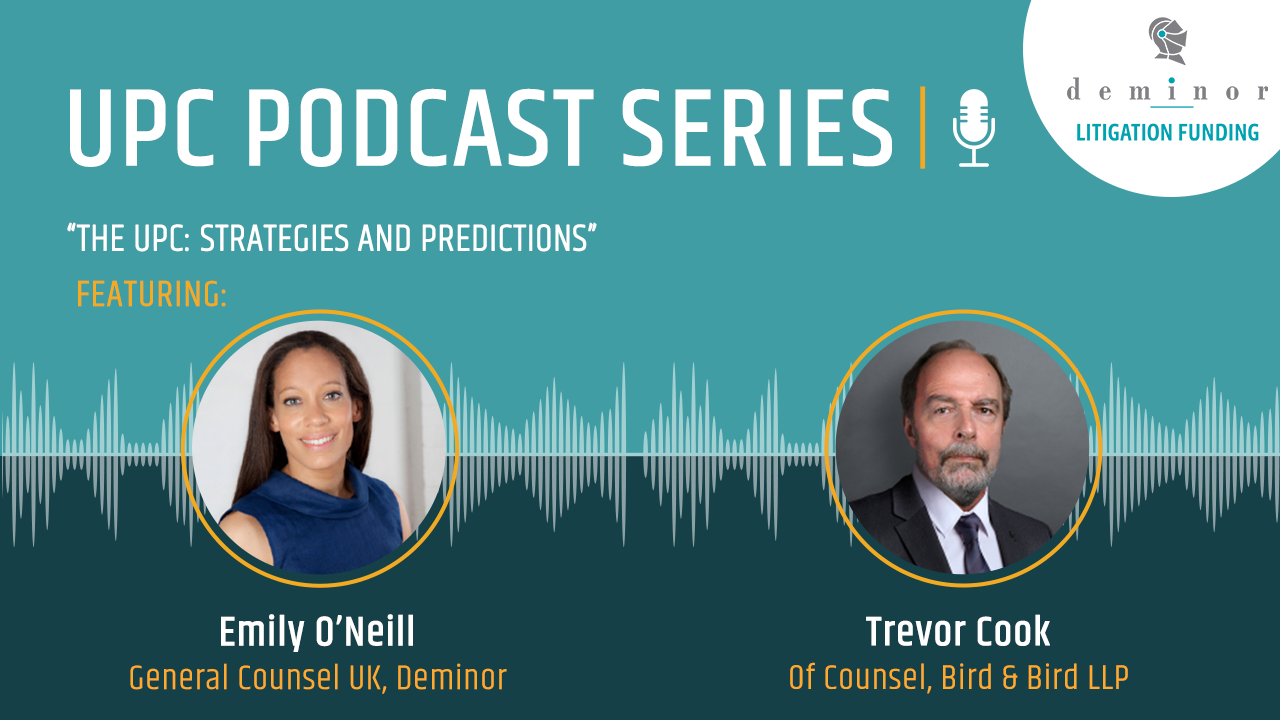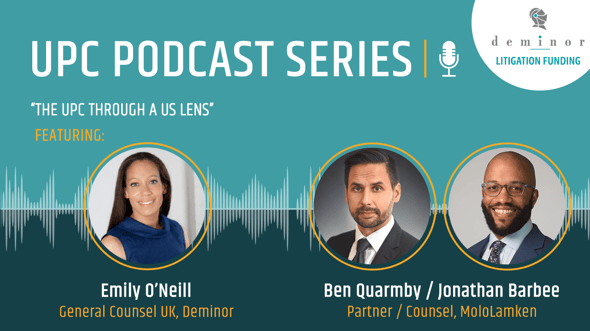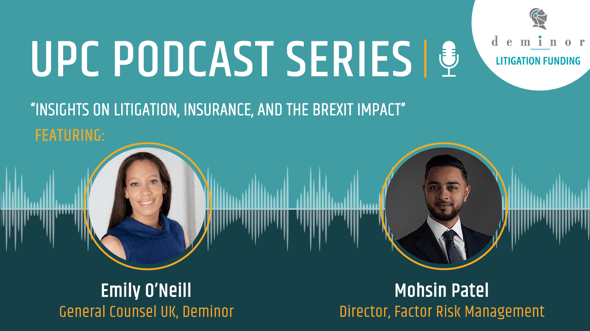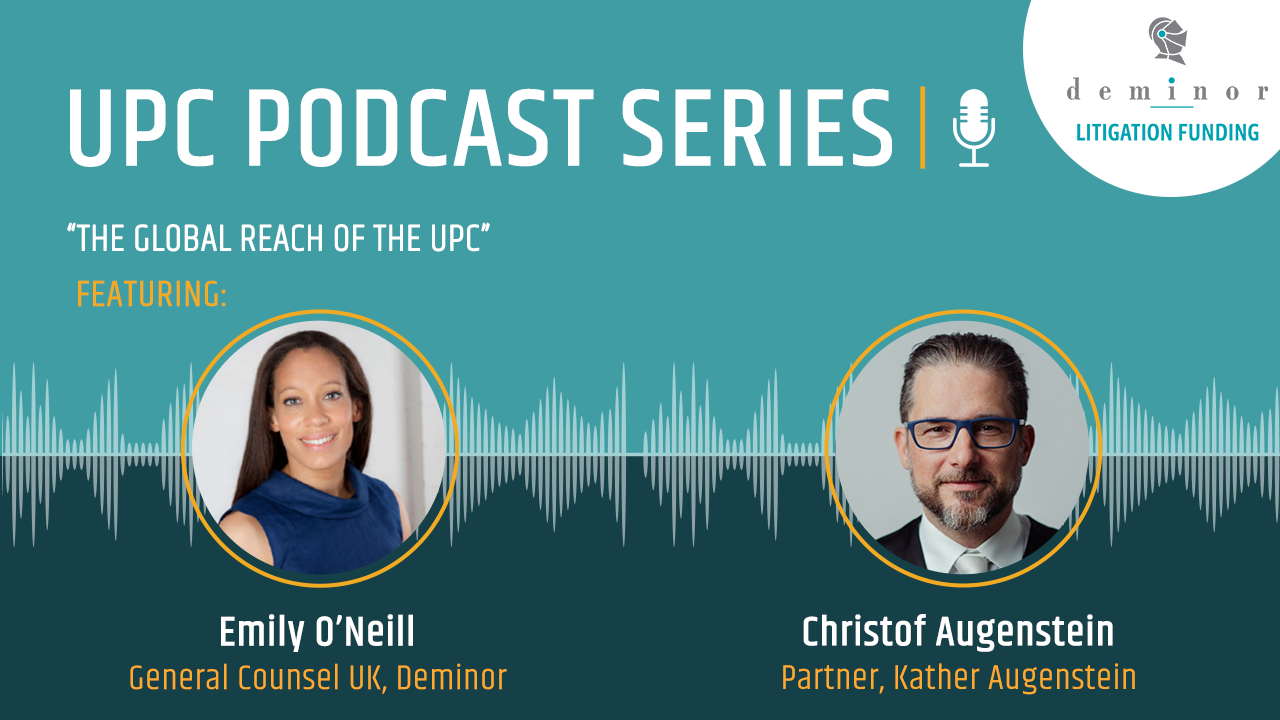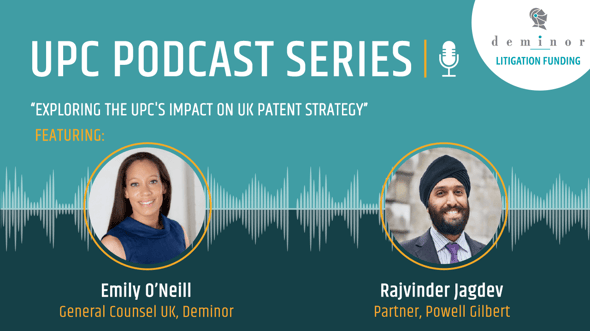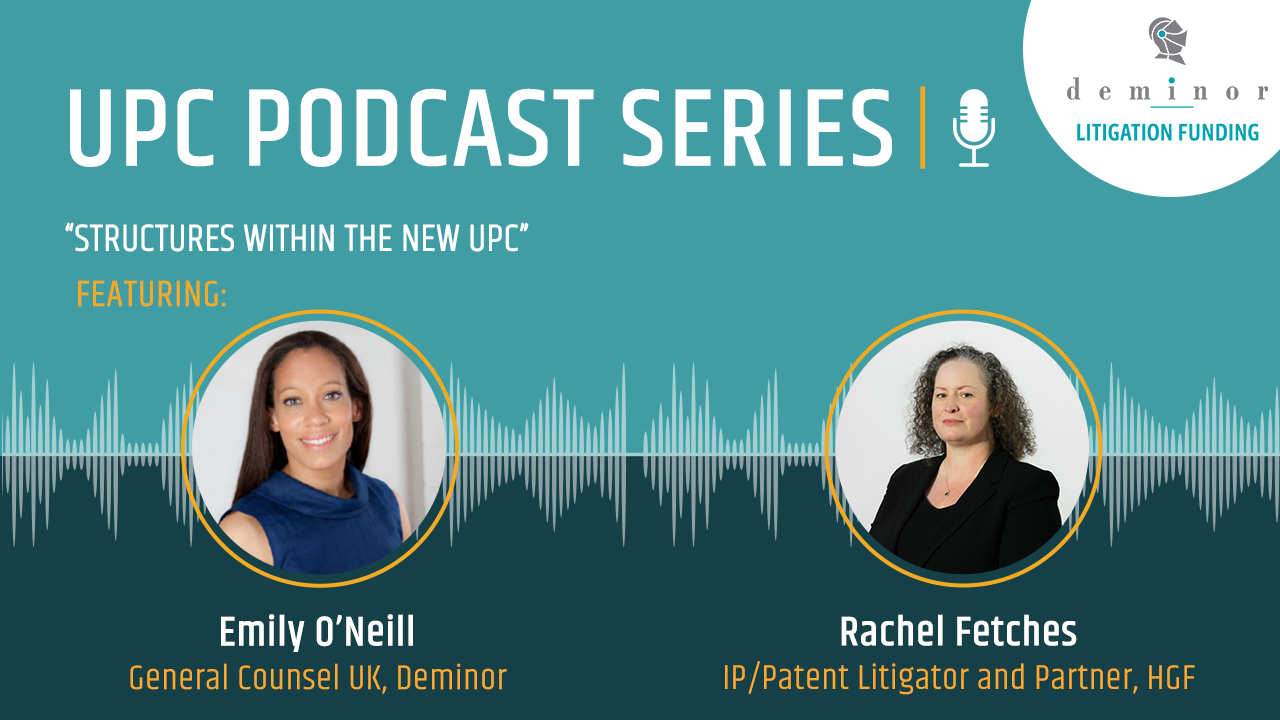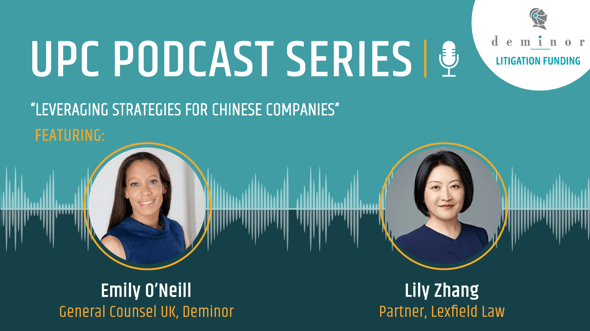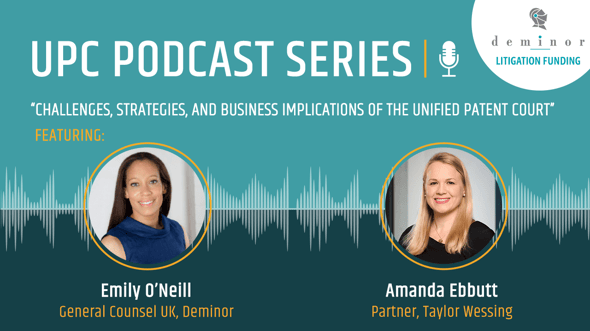In this podcast series, Emily O'Neill General Counsel UK and Global Intellectual Property lead for Deminor Litigation Funding, undertakes interviews with global professionals to understand the implications of the new Unified Patent Court (UPC).
Deminor welcomes you to join this conversation as we summarise the key elements of the conversations between Emily O'Neill and these experts, as captured in the podcast transcripts below.
Podcast Preface:
The arrival of the UPC promised to revolutionise patent enforcement in Europe. Upholding its mission to streamline the process for companies utilising this system, the UPC introduces a multi-jurisdictional court, embodying a profound shift in the landscape of patent litigation across Europe for those using the system.
The UPC brings with it a myriad of unknowns, yet the potential it holds cannot be understated. For businesses, in-house counsel, insurers, and litigation funders the court represents a significant milestone that will undoubtedly reshape the way intellectual property disputes are resolved and enforced. Its multi-jurisdictional framework requires a deep understanding of various approaches to litigation. Collaboration between these jurisdictions will prove indispensable as UPC Judges strive to harmonise practices and deliver consistent judgments.
Now that the UPC has been officially launched, the filing of cases thus far has offered valuable insights into its practical application. While the anticipated surge of pharmaceutical patent revocation cases has not really materialised, those cases are balanced by patentees seeking to enforce their rights. This underscores the transformative potential the UPC holds for both innovators and their legal representatives.
However, as the legal community prepares for this paradigm shift, a crucial question emerges: Are practitioners eagerly anticipating the challenge of mastering a new system with unfamiliar procedural rules? The allure of a more streamlined process must contend with the practicalities of adapting to a fresh set of procedural rules and approaches.
In this blog series, Deminor General Counsel UK, Emily O'Neill, has drawn on the extensive expertise and viewpoints of experts, exploring the potential opportunities and risks that lie ahead for businesses and practitioners within this new legal landscape.
Examining with her guests key aspects including; jurisdictional collaboration, procedural nuances, and the strategic considerations in leveraging the UPC, this series aims to equip knowledgeable practitioners with the insights needed to navigate this transformative era of European patent litigation.
Now that the UPC has opened its doors and practitioners are starting to file cases, it is a good time to take a temperature check as to how practitioners feel about the new Court.
Podcast Excerpts:
From 'Strategies and Predictions' - Trevor Cook (Of Counsel), Bird & Bird LLP
Trevor Cook – "The UPC is an extraordinarily exciting development in Europe. It's the biggest development in patent litigation in Europe since the EPC, back in the 1970s. It's certainly going to shake up patent litigation in Europe in a major way. And it's going to be fascinating to see how it all works out. It's something very exciting to watch."
The full episode of this interview in the UPC Podcast Series is available here: https://www.deminor.com/en/blog/upc-podcast-series-with-emily-oneill-featuring-trevor-cook/
From 'The UPC Through a US Lens' - Ben Quarmby (Partner) & Jonathan Barbee (Counsel), MoloLamken:
Ben Quarmby – "From the outside looking in, as US practitioners, we see this as a potential additional forum for many of our clients. A forum with enormous potential. A forum that opens up a lot of opportunities for them, but also a forum with a lot of question marks. So we're looking at it closely. We think if it lives up to expectations, it can be a spectacular opportunity for us and for our clients. But there are still many questions that are going to be answered in the next year and a half as the first few cases make their way through the process. Very interesting, lots of opportunity. We're keeping a close eye on it, but we still have some questions."
Jonathan Barbee – "We are very curious to see what happens and I'm very excited and very hopeful. We're definitely looking to get involved with the UPC when we can, both with our US-based clients and our foreign clients as well – hopefully trying to use the UPC as a complement to US litigation, especially with some of the downsides of US litigation, including IPRs at the Patent Trial and Appeal Board and issues with subject-matter eligibility under 101. This will be a new bright light, full of potential for the patent litigation world. I think this is also really important with the general trend and the globalization of litigation and patent campaigns. We've seen more patent disputes arbitrated internationally and so this I think will make it easier for litigants to pursue and enforce their portfolios across the globe."
The full episode of this interview in the UPC Podcast Series is available here: https://www.deminor.com/en/blog/upc-podcast-series-with-emily-oneill-featuring-ben-quarmby-jonathan-barbee
From 'Insights on Litigation, Insurance, and the Brexit Impact' - Mohsin Patel (Director) Factor Risk Management:
Mohsin Patel – "I'm quite excited about the UPC because, from a funding point of view, it will increase the level of damages. So yes, not all of the European states are in, and then the non-EU states, notably the UK, which is a big patent litigation center. But even expanding the number of jurisdictions which are covered by a particular claim to two or three is still going to increase the level of damages. And economics is important from a funding perspective."
The full episode of this interview in the UPC Podcast Series is available here: https://www.deminor.com/en/blog/upc-podcast-with-mohsin-patel/
From 'The Global Reach of the UPC' - Christof Augenstein (Partner), Kather Augenstein:
Christof Augenstein – "Yes, 100%. For a patent litigator, this is a unique and historic opportunity to start a new legal system from scratch. I’ve been working on the UPC for many years. I have liaised with European colleagues, written commentary about the UPC, and had various other engagements regarding the UPC. To me, it's fascinating to approach these legal issues from various different angles. I'm excited to go to trial, discuss all these new possibilities with the judges, find out what is the best way forward and be more creative. The only thing I need is clients that are willing to pay because that's the other issue - this will cost money. The first cases will be more comprehensive, and so they’ll cost more money than the ones we'll be doing five years from now. So with that caveat, yes, I'm very much looking forward to the opportunity to establish a new, suitable and modern system for patent litigation."
The full episode of this interview in the UPC Podcast Series is available here: https://www.deminor.com/en/blog/upc-podcast-series-with-emily-oneill-featuring-christof-augenstein/
From 'Exploring the UPC's Impact on UK Patent Strategy' - Raj Jagdev (Partner), Powel Gilbert LLP:
Raj Jagdev – …Of course, we're very excited about the imminent launch of the UPC. It's an attractive new forum. But we don't know how it's going to play out. We have a comprehensive set of rules and procedures. They look great on paper. But how they'll actually be implemented remains to be seen. And that's what we'll be watching very carefully in the short term.
The full episode of this interview in the UPC Podcast Series is available here: https://www.deminor.com/en/news/upc-podcast-with-raj-jagdev/
From 'German Judges Respond to the UPC' - Andreas Wietzke (Partner), Mathys & Squire LLP:
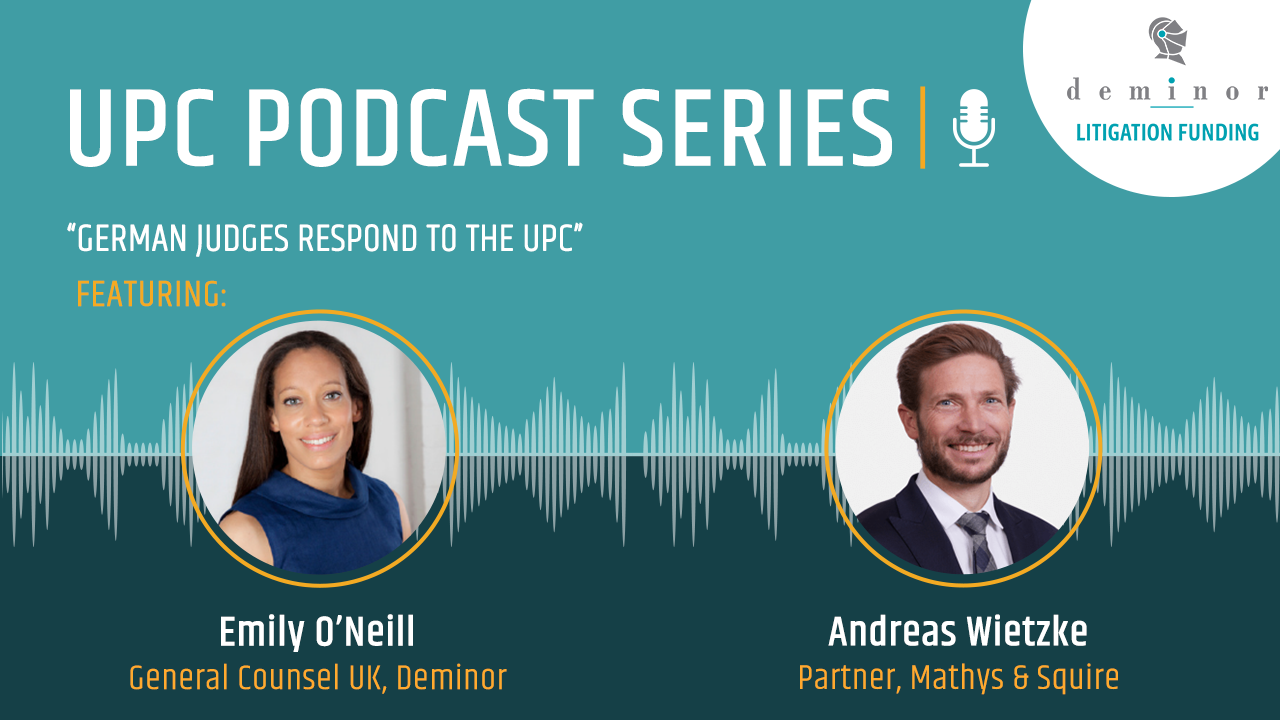
Andreas Wietzke – This is going to be massive. I'm extremely excited because this one also gives a huge bunch of new tools and playground for us attorneys, things to do, things no one has thought about using, bending the rules or the holes in the rules. So I'm really looking forward to making use of all of this.
The full episode of this interview in the UPC Podcast Series is available here: https://www.deminor.com/en/blog/upc-podcast-with-andreas-mathys-squire/
From 'Structures within the New UPC' - Rachel Fetches (Partner), HGF Limited:
Rachel Fetches – "It’s the biggest change in a generation, and we have to see it as an opportunity. I think in the first couple of years it will be for companies that are willing to take a risk, because there will be an awful lot of challenges, and litigators testing the boundaries. But in three years to five years, I think it will be a really successful court."
The full episode of this interview in the UPC Podcast Series is available here: https://www.deminor.com/en/blog/upc-podcast-series-with-emily-oneill-featuring-rachel-fetches/
From 'The Impact on French Patent Litigation' - Thomas Cuche (Partner), DTMV Avocats:
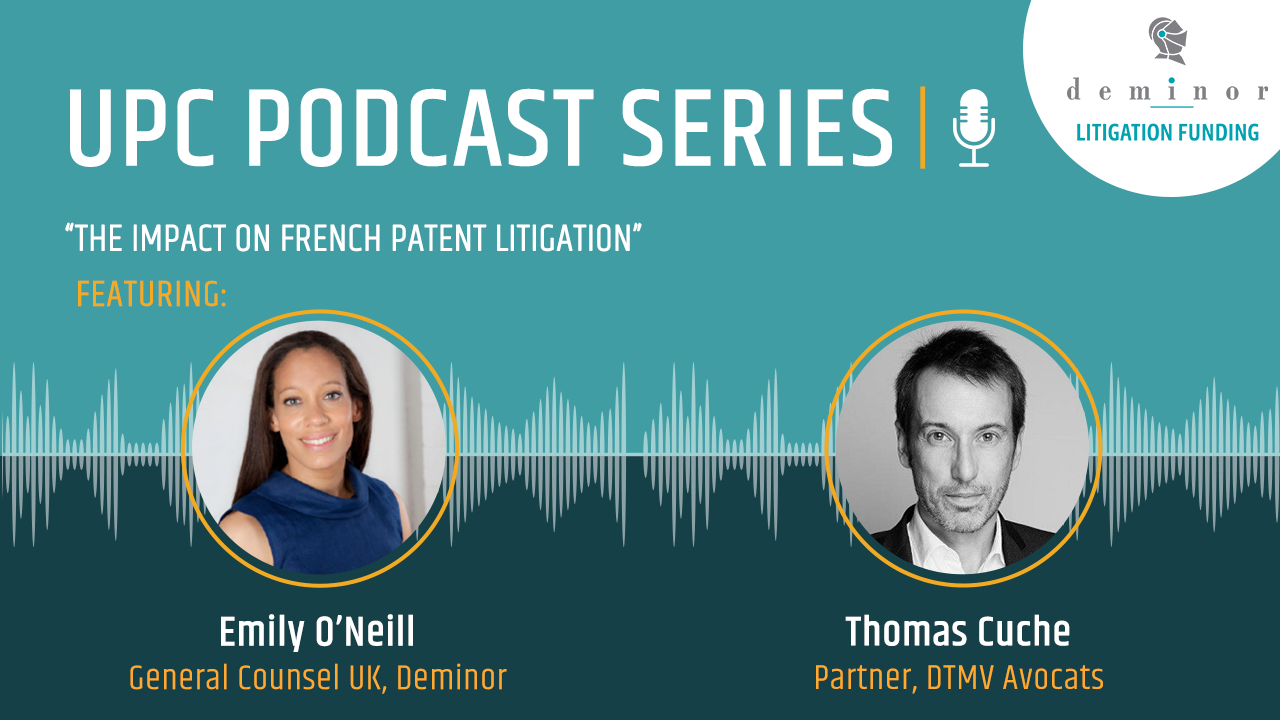
Thomas Cuche – Of course! I think all patent litigators are excited about this new jurisdiction. It happens once in a professional life. So yes, I am very excited, as are all my friends, colleagues and people working in the patent field. I don't know if the stakeholders and clients are so excited. But we will find out!
The full episode of this interview in the UPC Podcast Series is available here: https://www.deminor.com/en/blog/upc-podcast-series-with-emily-oneill-featuring-thomas-cuche/
From 'German Litigators Respond to the UPC' - Alex Ritter (Partner), Baker McKenzie:
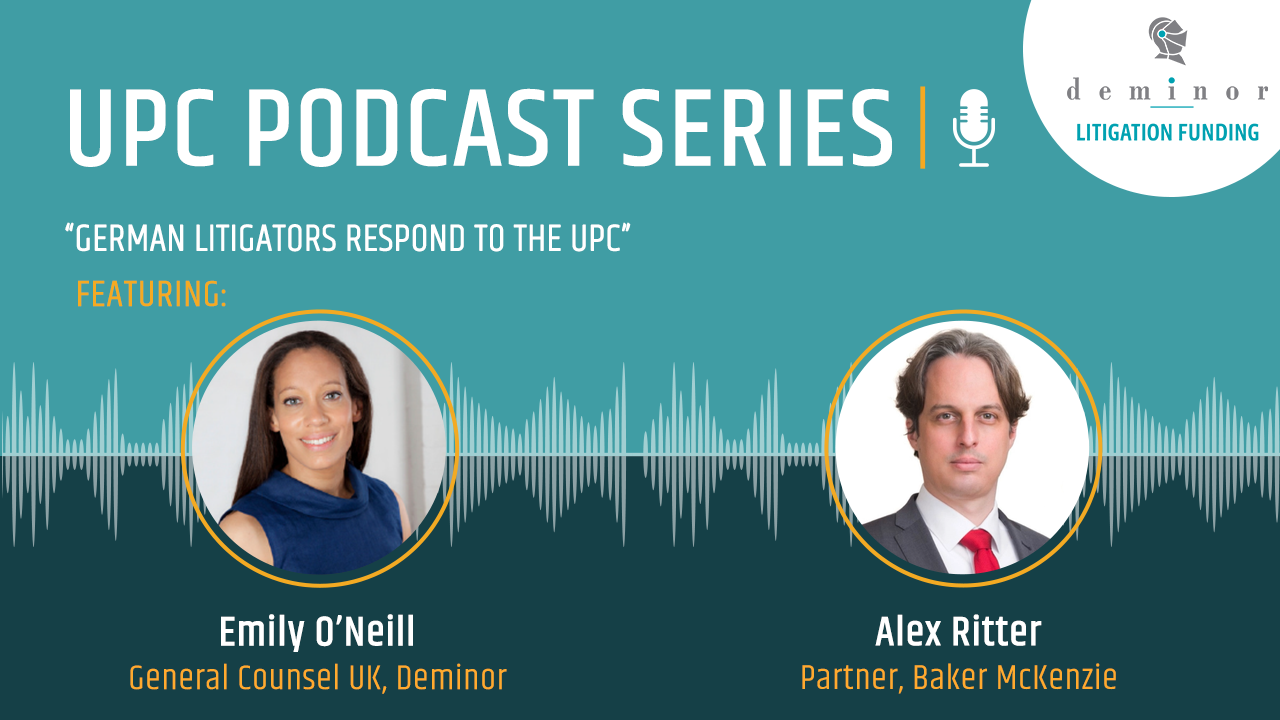
Alex Ritter – "Yes, definitely. This is the biggest change in European Patent Litigation since the 1970s when the European patent convention was originally put into place. And it’s also the first pan-European Civil Court. Being a part of this from the beginning is definitely exciting."
The full episode of this interview in the UPC Podcast Series is available here: https://www.deminor.com/en/blog/upc-podcast-series-with-emily-oneill-featuring-alex-ritter/
From 'The Dutch Terrain for Patent Litigation' - Wim Maas (Partner), Taylor Wessing :
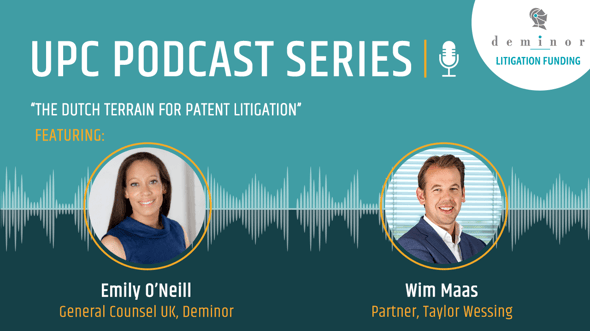
Wim Maas – " Yes, I am really looking forward to the system. From my own personal perspective, I would like to get a piece of the action! I think Taylor Wessing will be able to play our part for our clients, so I'm pretty confident that I will get what I want to be able to play in this new system as well. So I'm really looking forward to it, and hopefully, when the system starts on 1st June, it will also be a kick-off for us to do the first cases that we have been preparing now for a year. We thought it would never actually come.
For the last year we have been doing UPC training with clients, we have been training ourselves, we have been doing analysis and mock trials. When you’ve been training for a match for so long, you look forward to actually performing on the pitch, right? That is how we feel, and I think that probably applies to all patent litigators. When you look at LinkedIn, you see a lot of patent litigators, talking about the UPC, all hoping to get a piece of the action, and I really believe that Europe will see a lot more action. It’s not simply a case of dividing the cookie we have, but it will increase the size of the cookie for everyone. I really think it will bring more and bigger cases to us, and also from the US.
Right now, you see a lot of action going on in the US, which will never go to Europe, and I think that will change. That’s me looking into a crystal ball, but that's what I expect. I also think that US law firms will find the system interesting. It's never really worked well for them to set up an office in, for instance, the Netherlands, and be involved in patent litigation in only one or a few European countries. But with the UPC, it could be worthwhile for them to set up a law firm somewhere in Europe to do UPC cases for their own US clients. So I really believe there will be more coming from the US, but maybe also from China and other Asian countries."
The full episode of this interview in the UPC Podcast Series is available here: https://www.deminor.com/en/blog/upc-podcast-series-with-emily-oneill-featuring-wim-maas/
From 'Leveraging Strategies for Chinese Companies' - Lily Zhang (Partner), Lexfield Law:
Lily Zhang – " I am excited personally because I used to work in a London-based law firm with a lot of European colleagues on patent cases and other IP disputes. Now we have the opportunity to support Chinese patentees to handle their cases with our European colleagues, which will be a nice experience for me.
From a patentee perspective, most small and mid-sized Chinese companies have business in Europe, but they don't have large legal resources. The UPC will be very helpful for them if we can find suitable, competent, cost effective, European patent lawyers to advise them."
The full episode of this interview in the UPC Podcast Series is available here: https://www.deminor.com/en/blog/upc-podcast-series-with-emily-oneill-featuring-lily-zhang/
From 'Challenges, Strategies, and Business Implications of the Unified Patent Court' - Amanda Ebbutt, (Partner), Taylor Wessing:
Amanda Ebbutt – "There was a lot of hesitation about how the system would be used and who would be taking advantage of it when it first opened. And I think there are probably three factors I would look at when thinking about the popularity and the take-up of the court. Firstly, the level of opt-outs, the level of take-up of the unitary patent, and then, of course, who's using the court and the number of cases."
The full episode of this interview in the UPC Podcast Series is available here: https://www.deminor.com/en/blog/challenges-strategies-and-business-implications-of-the-unified-patent-court/
UPC Podcast Series - Next steps and further information:
Thanks for joining Deminor's UPC Podcast Series as we deep dive into the ins and outs of the new Unified Patent Court.
Keep a look out for our upcoming interviews as Deminor General Counsel UK and Global Intellectual Property lead, Emily O'Neill, speaks with several more experts to get their insights on the UPC.
If you would like to connect with Emily on LinkedIn, please click on the link below:
Deminor, General Counsel UK and Global IP lead - Emily O'Neill
***
Further Reading:
- https://www.deminor.com/en/case-studies/co-funder-proposes-sharing-of-litigation-funding-risk-to-leverage-deminors-in-house-due-diligence-capability
- https://www.deminor.com/en/case-studies/financing-assertion-of-patents-protecting-manufacturing-processes
- https://www.deminor.com/en/case-studies/telecoms-patent-assertion-multi-jurisdictional-campaigns
- https://www.deminor.com/en/case-studies/canadian-innovative-start-up-preparing-for-a-david-v-goliath-litigation-funding-battle
- https://www.deminor.com/en/case-studies/whats-the-risk-assessing-the-risk-of-counter-assertion-by-the-defendant-in-patent-litigation
- https://www.deminor.com/en/case-studies/overstepping-the-mark-litigation-funding-trade-mark-infringement
- https://www.deminor.com/en/case-studies/lights-camera-action-recovering-damages-for-infringement-of-rights-in-a-short-film
- https://www.deminor.com/en/case-studies/recovering-damages-for-stolen-software-through-litigation-funding
- https://www.deminor.com/en/case-studies/funding-in-the-pharma-sector-/-investing-in-a-case-where-litigation-is-already-ongoing


